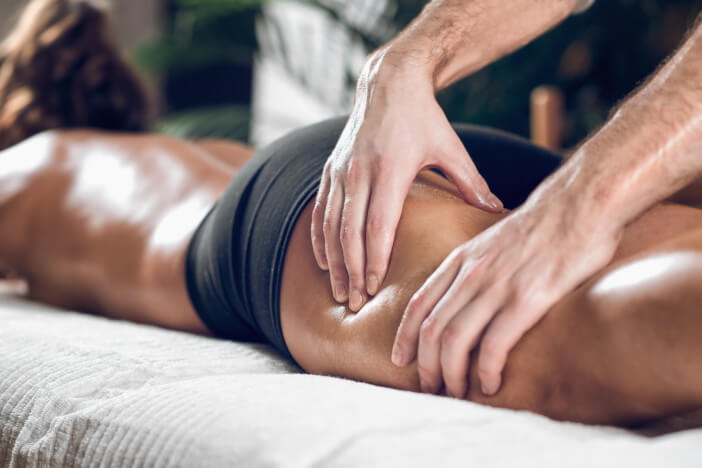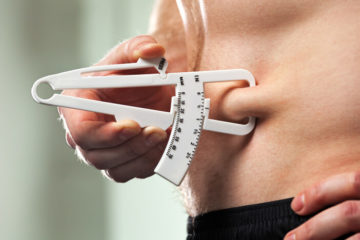Lymphatic Drainage: How to get rid of water retention

Summer is approaching, the weather is finally getting warmer but you suddenly don’t fit into your new sandals anymore because your feet are swollen? It’s probably because you are retaining too much water. But where does the water retention come from? And which foods help get rid of it?
In this article we explain the causes of water retention and how you can determine whether or not you have it.
If this interests you, then keep reading. At the end of the article you will receive practical tips from us on how you can easily get rid of water retention.
What is water retention?

As the name suggests, “water retention” is an increased accumulation of water in the body’s tissues.
The excess water escapes from the lymphatic system and blood vessels as a result of increased pressure and is pressed into the adjacent tissues. There the water accumulates, which can lead to visible swellings, also known as oedema. In theory, water retention can occur all over the body. However, the legs and feet are most frequently affected. They feel thick and heavy due to the accumulation of water.
Tired legs are often a sign of water retention.
How does water retention occur?
The hands, fingers, stomach and face also tend to retain water. Have you ever looked in the mirror in the morning and thought your eyes looked a little puffy? Again, water retention may be the reason. Our lymphatic system is dependent on the force of gravity. Due to our horizontal sleeping position, the water may not be sufficiently removed overnight.
In such cases, a traffic jam of water occurs and it accumulates, which is why your eyes appear swollen the next morning. Below you can find out which circumstances can cause a lack of lymphatic drainage.
How can you tell if you have water retention?
Many people notice water retention through visual changes or an unpleasant feeling of tension. Are you unsure whether you suffer from water retention?
No problem, the following test will help you find out. Press on the swollen part of your body for a few seconds with your finger. If a dent remains afterwards, which only recedes gradually, it is probably due to water retention.
Since the accumulation of fluid in the tissue causes tension, water retention can also cause pain in some cases. But don’t worry, in most cases water retention is harmless. However, if you are consistently suffering from severe symptoms, it is advisable to consult a doctor. In some cases water retention can be a symptom of serious conditions such as hypothyroidism, heart disease, cancer or liver and kidney disease.
Tip: Find out everything about water, thirst and the body’s water balance here.
The 5 most common causes of water retention

Water retention can have many different causes. He are the 5 most common:
Poor nutrition
Both salt and sugar bind to water and promote fluid retention. Alcohol and caffeinated drinks should also be enjoyed in moderation. They are liquid thieves, which make your body try to store more water.
Lack of exercise
Long periods of standing and sitting, as is the case with many office jobs, can lead to water retention. Gravity causes our blood to sink into our legs. This causes increased pressure, which in turn leads to an accumulation of fluid in the tissue.
Hormonal fluctuations
Hormonal fluctuations are one of the most common reasons for water retention, especially in women. A distinction is made here between menstruation and pregnancy.
- During the menstrual cycle, the blood vessels are more permeable due to hormones, which means that more fluid can enter the tissue. This leads to water retention, which is a typical symptom of PMS (premenstrual syndrome). You can find out how you can support your menstruation with the help of nutrition here.
- In addition, many women suffer from increased water retention towards the end of pregnancy. The trigger here is the altered hormone balance in the connective tissue. Read our article in which we have summarized the right diet for before, during and after pregnancy.
Heat
In order to be able to dissipate the heat better, the blood vessels dilate. This slows down the blood circulation in the veins. They lose elasticity and become more permeable. This can lead to fluid flowing into the surrounding tissue. The veins no longer carry the water away sufficiently and gravity causes our legs to swell.
Certain medications
Medication for diabetes or high blood pressure, as well as antidepressants can be triggers for water retention.
Tips and tricks for combatting water retention

Now that you know how and why water retention occurs, the next step is to get rid of it. Find out here what you can do against too much water in your body and which foods have a dehydrating effect.
The right nutrition will get you to your goal
Take care to consume sugar and salt in moderation. These compounds bind to water so automatically increase water storage. Salt and sugar are often hidden in ready meals, snacks, sweets, heavily processed foods and sweetened drinks. Do you cook for yourself and don’t want to give up using salt in the kitchen? Get creative and test your way through the variety of herbs out there to give your dishes a completely new taste.
The micronutrients magnesium, potassium and vitamin B6, as well as foods with a high water content, support the drainage process. In the table below you will find a list of the foods containing these wonder weapons. In addition, make sure you drink enough water, more information about this can be found below.
The TOP foods for drainage
| Nutrient | Found in |
|---|---|
| Potassium |
|
| Magnesium |
|
| Vitamin B6 |
|
| Water-rich foods |
|
Exercise
You can alleviate water retention in your legs through regular exercise and even prevent it in the medium term. Your leg muscles will become stronger and able to counteract gravity a little by transporting water more easily through the bloodstream, back up to the heart.
Swimming is very good for drainage. The lymphatic vessels are stimulated by the hydrostatic pressure of the water, thus encouraging the backflow of blood. Not such a fan of water? No problem! Take a look at our traiining articles and be sure to find some exercises there that suit you and that you can easily integrate into your life. A tip for office workers: set yourself a reminder to get up and stretch your legs every now and then.
Don't be a wimp
If you are struggling with water retention, especially on hot summer days, you can stimulate drainage with a cold shower. The cold water causes the vessels to contract, which makes it easier to remove the liquid from the tissues. The effect can be encouraged by regular alternating hot and cold showers, as these stimulate the blood circulation. Basically, it is recommended to avoid saunas, hot showers or hot baths. In summer, try to spend as much time as possible in cool rooms and spaces.
Put your feet up
By raising your legs, you help your blood and lymph vessels to transport accumulated fluid back to the heart. Massages and fascial rolls can also help to increase the lymphatic flow.
Drink more water
Sounds counterintuitive at first, but water is actually a wonder weapon against fluid retention. The body of an adult consists of about 70% water and needs every percent of it. To prevent your body from drying out, it compensates by retaining water. You should consume alcohol and caffeinated drinks in moderation or avoid them altogether, as they draw water from your body.
Diuretic teas to combat water retention
If you would like a change from water, we have compiled a list of diuretic herbal teas that are suitable for drainage.
Caution: diuretic teas can be dangerous if consumed in too large quantities as they can dehydrate your body. Therefore, you should always read the instructions on the packaging before consuming them and never exceed the recommended dose.
| Diuretic teas for drainage | |
|---|---|
| Nettle Tea | Horsetail tea |
| Peppermint tea | Dandelion tea |
| Birch leaf tea | Juniper Tea |
| Green tea | Fennel Tea |
Tip: have you tried parsley tea? Simply bring a teaspoon of dried parsley to the boil in a pot with two cups of water, sieve and leave to stand covered for five to seven minutes.
Low Carb: the perfect diet for drainage

By manipulating the water balance in a targeted manner, it is possible to lose a relatively large amount of weight in a very short time without losing fat or muscle mass. This effect is especially used by athletes in martial arts or weight training to be classified in a lower weight class before a competition. The principle is relatively simple. The body stores carbohydrates in the form of glycogen in the muscles and the liver so that it can quickly access the stored energy sources again. On average, a person has about 300 – 400 grams of stored glycogen. In people with a lot of muscle mass, for example bodybuilders, the glycogen stores can sometimes reach 600 grams.
1 gram of glycogen binds to about 2.7 grams of water.
In low carb diets, the body’s glycogen stores are emptied by the reduction of carbohydrates. This results in enormous weight loss in the first few days. However, the weight loss is largely water loss, the body is dehydrated and does not break down fat. If you would like to know exactly how this works, our low carb article will explain it to you in more detail.
Here you can find out everything about the glycemic index and glycemic load.
There is a big difference between weight loss and fat loss.
That’s why it is important in low carb diets to take in enough protein and to include regular strength training. The goal of a diet should be to reduce fat mass and to maintain lean mass, i.e. muscles.
Our conclusion on water retention

Water retention can affect anyone and can occur almost anywhere in the body. If you have too much water in your body, you don’t have to worry, in most cases water retention is harmless. The right diet, regular exercise, drinking enough water and the addition of herbal teas and other little tricks will help you drain the water quickly. This will help you get your body’s water balance under control again very quickly.
FAQ
Many people notice water retention through an unpleasant feeling of tension or visual swelling in their body. If you are unsure, you can press your finger on the swollen body part for a few seconds. If you then see a dent that only gradually recedes, it is probably due to water retention.
The most common reasons are:
- Wrong diet
- Not enough movement
- Heat
- Menstruation
- Pregnancy
- Medications
- In some cases also diseases
The best tips are:
- A healthy diet
- Regular exercise
- Cold showers
- Putting your feet up
- Drinking water and herbal teas
Water, herbal teas such as nettle tea, peppermint tea, green tea and fennel tea.
1 gram of glycogen binds to about 2.7 grams of water. Humans have on average about 300 – 400 g of stored glycogen. In people with a high proportion of muscle mass (e.g. bodybuilders), this can be as much as 600 g stored glycogen.



